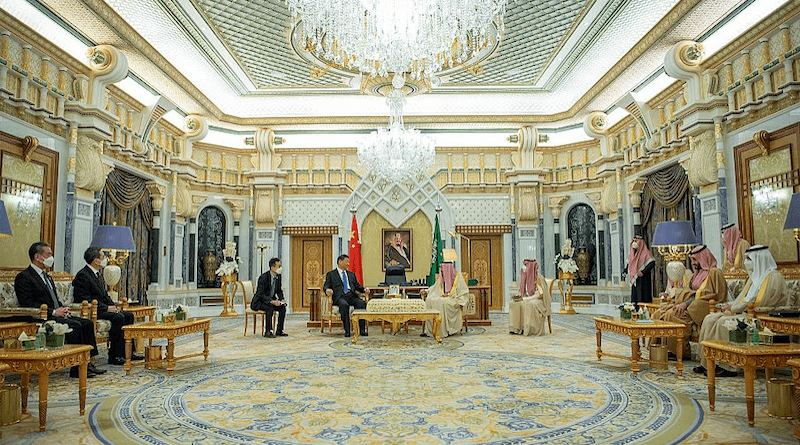Saudi Arabia’s Nod To The Shanghai Cooperation Organization – OpEd
By Arab News
By Dr. Mohammed Al-Sulami*
As the Kingdom steadily treads its path in line with Vision 2030, it won’t stop startling those less vigilant watchers who trumpet stereotypes instead of more nuanced analyses.
The Cabinet’s approval of Saudi Arabia’s partnership with the Shanghai Cooperation Organization did not happen out of the blue. A meticulous process coupled with multiple bilateral and multilateral contacts has been afoot for the past four years.
Riyadh applied for SCO dialogue partner status in 2019, which was formally approved in September 2021 and officially granted exactly a year later. Turkiye, Egypt and Qatar are other current dialogue partners while Iran is set to be granted full member status in April. The process of becoming a full member involves a few steps besides the consensus of all existing members. There appears to be no hurdles to the Kingdom’s inclusion by the member-states and secretariat.
From the Saudi perspective, the process of initiating engagement with the China-led SCO is based on the drive to diversify multilateral engagements globally as well as regionally. For decades, the Kingdom has been pursuing an interest-based foreign policy, which on occasions shook the world significantly — for example, the 1973-74 oil embargo. As Beijing is Riyadh’s topmost trading partner, it is only natural for the country to cement ties with the world’s second superpower. The Kingdom is keen to engage deeply with the Central Asian republics alongside Pakistan, Russia and India through one platform where heads of state or governments meet every second year. The embrace also fills the void in Saudi foreign policy outreach when it comes to Central Asia and Eurasian states.
The SCO, which already brings archrivals India and Pakistan to the table, will now see Saudi Arabia and Iran share the same forum, after the UN and OIC. After the recent breakthrough talks in Beijing, the two Gulf neighbors have committed to improving their bilateral relations. As the first step, their severed diplomatic ties will resume. Then, the Iranian president is likely to visit Saudi Arabia. For now, a lot depends on atmospherics and confidence-building measures agreed to by both sides. Given the age of polarization and anarchy in global affairs, the Kingdom is betting on improving ties, especially with its antagonist neighbors. That is in sync with the spirit of the SCO, which urges its members to set aside differences and work on commonalities.
Some observers speculate that Saudi Arabia’s entry into the SCO is a byproduct of the Beijing breakthrough. They are outright wrong. Riyadh initiated the process of affiliation about half a decade ago when rapprochement with Iran was far from expected.
Iran, on the other hand, has sought the bloc’s membership since July 2005 but its own policies and actions resulting in sanctions obstructed its entry. The pressure eased with the signing of the Joint Comprehensive Plan of Action in July 2015, but the Trump administration’s policies led some members to object to Tehran’s membership.
The SCO’s main goals include: Strengthening mutual trust and neighborliness among member states; promoting their effective cooperation in politics, trade, economy, research, technology and culture, as well as in education, energy, transport, tourism, environmental protection, and other areas; making joint efforts to maintain and ensure peace, security and stability in the region; moving toward the establishment of a democratic, fair and rational new international political and economic order; and establishing an internal policy based on the principles of mutual trust, mutual benefit, equality, mutual consultations, respect for cultural diversity, and a desire for common development, while conducting an external policy in accordance with the principles of non-alignment, non-targeting any third country, and openness.
The Council of Heads of State, the SCO’s supreme decision-making body, meets once a year and adopts decisions and guidelines on all important matters for the bloc. The council also convenes once a year to discuss the bloc’s multilateral cooperation strategy and priority areas, to resolve current important economic and other cooperation issues, and to approve the bloc’s annual budget.
The bloc is not just expanding but its identity is evolving too. With the rise of China as a superpower, not all member-states have similar expectations from the bloc. Certainly, the SCO is not merely emerging as some kind of security alliance, which enhances its acceptability. It is a geopolitical and geo-economic forum with a wealth of natural resources, manpower, and interconnectivity. Nonetheless, the SCO holds anti-terrorism drills every other year, bringing together militaries that usually don’t engage in war games at bilateral or multilateral forums. Except for this tactical interaction, security issues are off the table. With some bitter rivals sharing the platform, the bloc is beset with many stress tests ahead.
For the SCO, the Kingdom brings bigger financial muscle and greater ideological diversity, undercutting the existing seclusion and current snail-paced progress. Saudi Arabia can help the bloc in strengthening its Inter-Bank Consortium. Despite Beijing and Moscow’s desire, there is still internal opposition to linking the SCO’s financial infrastructure to the BRICS Bank. Joining the SCO also opens Saudi Arabia’s economy and companies’ opportunities to invest in diverse markets with better rates of return in accordance with Vision 2030.
• Dr. Mohammed Al-Sulami is president of the International Institute for Iranian Studies (Rasanah).

